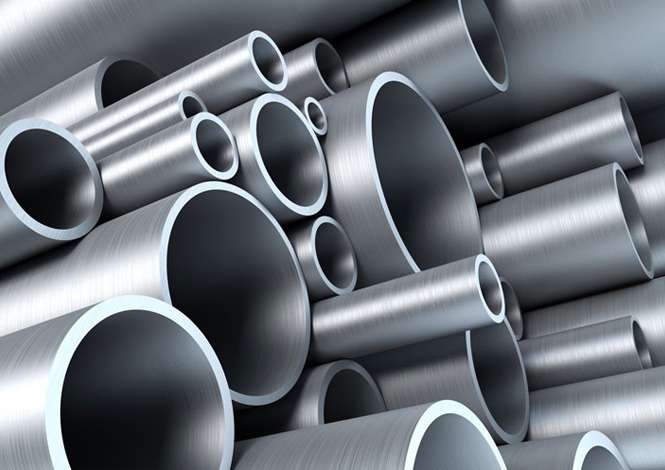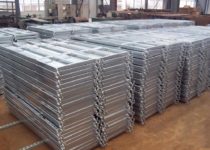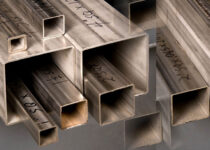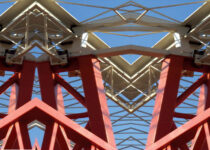How to Choose Right Steel ERW Pipe and Tube Products in UAE
How to Choose the Right Steel ERW Pipes and Tubes Products in UAE/MENA: The United Arab Emirates (UAE) has emerged as a global hub for industrial and construction activities, and the demand for high-quality steel products, including Electric Resistance Welded (ERW) pipes and tubes, has been on the rise. Steel ERW pipes and tubes are indispensable components in various industries, such as oil and gas, construction, automobiles, fire-fighting, irrigation, plumbing, furniture, fencing, Scaffolding manufacturing, and infrastructure development.
Choosing the right steel ERW pipe and tube products is critical to the success of any project. In this comprehensive guide, we will explore the key factors to consider when selecting the right steel ERW pipe and tube products in the UAE and other MENA countries.
What are Steel ERW Pipes and Tubes
Steel ERW pipes and tubes are a common type of steel product used for conveying liquids, gases, or solids in a variety of applications. These products are made by continuously forming a strip of steel into a cylindrical shape and welding the edges using electrical resistance. ERW pipe and tube products are known for their high-strength, durability, and cost-effectiveness, making them a preferred choice in the construction, automobiles, fire-fighting, irrigation, plumbing, furniture, fencing, Scaffolding and industrial sectors.
Assessing Your Project Requirements
Before you start searching for the right steel ERW pipe and tube products in the UAE, it’s essential to assess your project’s specific requirements. Factors to consider include:
- Size and Diameter: The size and diameter of the steel ERW pipes and tubes you need depend on the volume and type of material you intend to transport.
- Material Grade: The choice of material grade is crucial for corrosion resistance, strength, and durability. Common materials used include carbon steel, stainless steel, and alloy steel.
- Pressure and Temperature Requirements: Different applications may require Steel ERW pipes and tubes capable of withstanding specific pressure and temperature conditions.
- Coating and Finishing: Consider whether you need additional protection such as galvanization, painting, or other coatings to prevent corrosion.
- Length: Determine the required length of ERW pipes and tubes for your project, as it can affect installation and transport logistics.
Check Quality Standards of Steel ERW Pipe and Tube

In the UAE and MENA countries, it’s vital to ensure that the steel ERW pipe and tube products you choose meet international and local quality standards. The following standards are commonly used for assessing the quality of ERW products:
- American Society for Testing and Materials (ASTM) standards: ASTM standards provide guidelines for materials and testing methods, ensuring that ERW pipe and tube products meet specific quality and performance requirements.
- American Petroleum Institute (API) standards: These standards are especially relevant for applications in the oil and gas industry. API standards cover materials, manufacturing, and inspection criteria for pipes and tubes.
- British Standards (BS): The BS standards are widely recognized and used in the UAE for various construction and industrial applications.
- European Norm (EN) standards: The EN standards are also applicable in the UAE and provide specifications for steel products, including ERW pipes and tubes.
Make sure to inquire about the quality certifications and compliance of the steel ERW pipe and tube products you are considering for your project. In the UAE and other Middle East countries, local regulatory bodies and industry associations may have specific standards and certifications that should be adhered to.
Reputable Manufacturers and Suppliers of ERW Pipes/Tubes
Once you have a clear understanding of your project requirements and the quality standards to look for, the next step is to find reputable manufacturers and suppliers of steel ERW pipes and tubes in the UAE and MENA like Spar Steel. Consider the following factors when evaluating potential suppliers:
- Reputation: Look for suppliers with a strong reputation for delivering high-quality products and meeting customer requirements. Online reviews, testimonials, and references can provide valuable insights.
- Experience: Manufacturers and suppliers with a proven track record and years of experience in the industry are more likely to provide reliable and consistent products.
- Product Range: Choose a supplier that offers a wide range of steel ERW pipe and tube products to ensure you have options that match your project’s requirements.
- Location and Logistics: Consider the proximity of the ERW pipes and tubes supplier’s location to your project site. Proximity can affect transportation costs and lead times.
- Customer Support: Good customer support by steel pipes and tubes suppliers is essential for resolving issues, providing technical assistance, and ensuring smooth project execution.
- Price and Cost: While price is a consideration, it should not be the sole determining factor to right steel ERW pipe and tube products manufacturer and supplier in UAE. Balance cost with quality to make a cost-effective decision.
- Delivery and Lead Times: Ensure that the right steel ERW pipe and tubes supplier can meet your project’s timelines by discussing delivery schedules and lead times.
Inspection and Testing of Steel ERW Pipe and Tube products
Before accepting the right steel ERW pipe and tube products in UAE and the Middle East for your project, it’s crucial to conduct thorough inspection and testing. This helps ensure that the products meet the specified quality standards and project requirements. Common inspection and testing methods include:
- Visual Inspection: Examine the ERW pipes and tubes for any visible defects, such as dents, scratches, or corrosion.
- Dimensional Inspection: Check the dimensions of the steel ERW pipe and tube products to verify their compliance with project specifications.
- Material Testing: Conduct material tests, such as chemical composition analysis, to confirm the material grade and quality of steel pipes and tubes.
- Mechanical Testing: Perform mechanical tests, including tensile, impact, and hardness tests of pipes and tubes, to assess the product’s strength and performance characteristics.
- Non-Destructive Testing (NDT): Utilize NDT techniques like ultrasonic testing, radiography, and magnetic particle inspection of pipes and tubes to detect internal defects or flaws.
- Coating Inspection: If the steel ERW tube and pipe products are coated, assess the coating quality for adherence and uniformity.
It’s essential to work with a reputable third-party inspection agency to ensure the impartiality and accuracy of the inspection and testing process.
Cost Considerations to Choose Right Steel ERW Pipe and Tube Products

While choosing the right steel ERW pipe and tube products in the UAE and MENA, it’s essential to consider your project’s budget and the total cost of ownership. Keep in mind the following cost-related factors before choosing tubes and pipes for purchase:
Initial Cost: The upfront cost of purchasing steel ERW pipes and tubes, including transportation and logistics.
Maintenance and Repairs: Consider the long-term maintenance and repair costs associated with the chosen steel ERW pipe and tube products.
Operational Efficiency: Assess how the selected pipes and tubes may impact your project’s operational efficiency and costs.
Total Cost of Ownership: Calculate the total cost of ownership, including initial cost, maintenance, and operational costs over the product’s lifespan.
Sustainability of Steel ERW Pipes and Tubes
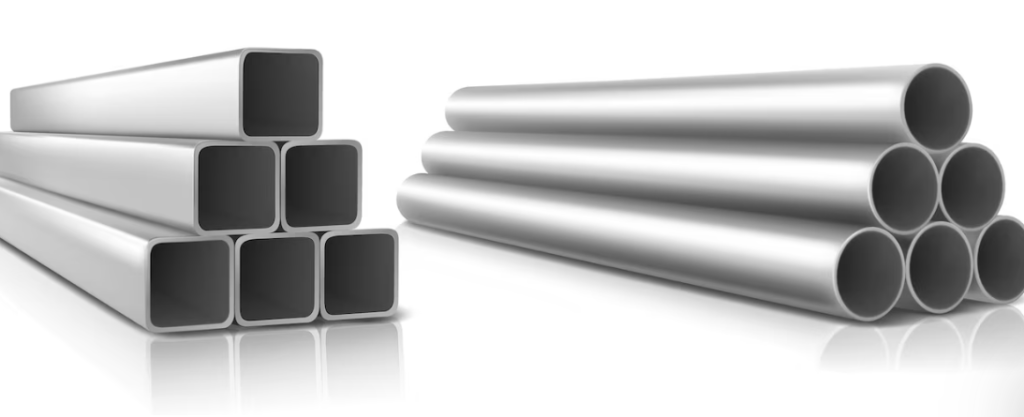
Sustainability and environmental considerations have become increasingly important in today’s construction and industrial projects. When choosing steel ERW pipe and tube products in the UAE, think about the environmental impact. Consider the following:
- Sustainable Materials: Opt for materials used in ERW pipes and tubes that are recycled or have a low environmental impact on.
- Energy Efficiency: Assess whether the products contribute to energy efficiency in your project, reducing long-term operational costs.
- Recycling and Disposal: Determine the ease of recycling or disposing of the steel ERW pipe and tube products once they reach the end of their lifecycle.
- Compliance with Environmental Regulations: Ensure that the ERW pipe and tube products and manufacturing processes comply with local and international environmental regulations.
Local Regulations and Standards Govern Steel Products in UAE
The UAE has specific regulations and standards that govern the import, sale, and use of steel products, including ERW pipes and tubes. It’s essential to stay informed about these regulations and ensure that the steel ERW pipe and tube products you choose comply with local standards. Some of the relevant regulatory bodies in the UAE include:
- Emirates Authority for Standardization and Metrology (ESMA): ESMA sets standards for various products in the UAE, including steel products.
- Dubai Civil Defence: If your project is in Dubai, you may need to comply with the regulations set by the Dubai Civil Defence
FAQs on How to Choose the Right Steel ERW Pipes and Tubes Products in UAE
Q. What are the different types of ERW pipes?
Ans. The different types of ERW (Electric Resistance Welded) pipes include carbon steel ERW pipes, stainless steel ERW pipes, alloy steel ERW pipes, and specialty ERW pipes for specific applications.
Q. What is the ASTM standard for ERW pipe?
Ans. The ASTM standard for ERW (Electric Resistance Welded) pipe is ASTM A53, which covers carbon steel ERW pipes commonly used in various applications, including plumbing and construction.
Q. Who is the manufacturer of ERW tubes in the UAE?
Ans. The most reliable manufacturer of steel ERW pipes and tubes in the UAE is Spar Steel Industries LLC for Steel Industries, and Future Pipes Industries.
Q. What is the difference between ERW and CDW pipes?Ans. ERW (Electric Resistance Welded) pipes and tubes are made by welding the edges of a steel strip, while CDW (Cold Drawn Welded) pipes are drawn through a die to achieve their final shape. CDW pipes are generally smoother and have tighter tolerances compared to ERW pipes.

